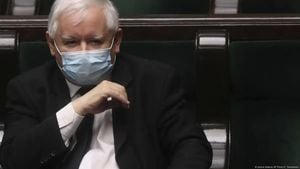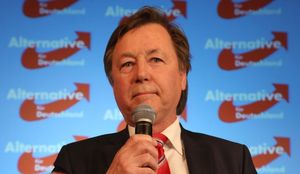Donald Trump is revving up his rhetoric on trade as he prepares for his upcoming presidency with plans to impose hefty tariffs on foreign imports. During his first press conference since being elected, held at his Mar-a-Lago estate, Trump dropped the names of Brazil and India as countries he plans to target for increased tariffs. His message was clear: if countries such as Brazil and India are charging high tariffs on American goods, he intends to reciprocate.
“We’re going to treat people very fairly, but the word ‘reciprocal’ is important because if someone charges us... if India charges us 100% and we charge nothing for the same thing, they send us a bicycle, we send them a bicycle, but they charge us 100, 200. India charges a lot, Brazil charges a lot. If they want to charge us, fine, but we’re going to charge the same,” Trump stated emphatically.
This declaration marks the first time Trump has explicitly mentioned Brazil as part of his tariff plans since the election. Historically, his focus had been largely on major trade partners such as China, Mexico, and Canada. The Brazilian economy has been intertwined with U.S. trade relations, with Brazilian exports to the U.S. reaching $19.2 billion during the first half of the year, reflecting a 12% increase over the same period the previous year.
Trump's administration aims to boost the American manufacturing sector, claiming these tariffs will create more jobs domestically. During his campaign, he promised to impose universal tariffs of 10% on all imports, with particularly steep 60% tariffs on products from China. He added, with much gusto, “Tariffs will make our country rich.”
Nevertheless, analysts are starting to sound alarms about the potential fallout. Experts warn these proposed tariffs could disrupt supply chains across the United States. Ding Yifang, a senior researcher at the Taihe Institute, noted the burgeoning inflationary pressures these tariffs could ignite. “If you start imposing tariffs across the board, you will see costs increase, and it could lead to higher inflation,” Ding pointed out. This could prompt the Federal Reserve to hike interest rates, which could counteract Trump’s promises to cut taxes for workers and small businesses.
Concerns also arose from Chinese economic experts, who underscored the broader impacts the proposed tariffs may have on American consumers and businesses. Li Bo, dean of the China Institute at Fudan University, indicated, “These tariffs are not just impacting China; American companies and consumers will also bear the costs.” He highlighted the interconnectedness of the supply chain, where American industries rely on intermediates imported from China. Should tariffs rise, it could harm the competitiveness of American companies both here and abroad.
During the press conference, Trump also addressed international conflicts, particularly referencing the wars in Ukraine and Syria. He commented on the military dynamics within those nations and expressed his thoughts on how the U.S. could play a role moving forward. He suggested Ukraine should be prepared to negotiate peace with Russia, stating, “This has to end.” Reflecting on these issues, Trump remained vague about U.S. troop involvement overseas.
The president-elect’s stance has also led to repercussions beyond countries he targets—like China already beginning to implement export controls on key high-tech materials to the U.S., including gallium and germanium. Chinese officials have stated these measures are aimed at protecting national security and reflect retaliatory actions against the U.S. amid the rising tensions over tariffs.
With regards to his relationship with China, Trump remained somewhat contradictory. While he expressed friendship with Xi Jinping, he also reiterated the need for accountability from China. Trump’s administration previously imposed tariffs to pressure the Chinese government to comply with economic agreements, but these recent statements have shifted the narrative. Nevertheless, Trump remarked, “China and the U.S. can resolve all the problems of the world,” hinting at hopes for collaboration amid growing disputes.
Still, as Trump pushes forward with his “America First” strategy, many wonder how his initiatives will fare against the reality of economic interdependency and the potential backlash from other nations. The consequences of such policies could fundamentally alter trade dynamics and possibly instigate broader economic instability.
Overall, Trump's administration appears poised to embrace aggressive trade measures right from the get-go as he seeks to implement his vision for American industry and labor. The immediate future remains uncertain as markets and governments worldwide await the specifics of Trump's tariff strategies and the likely ramifications for international trade.



